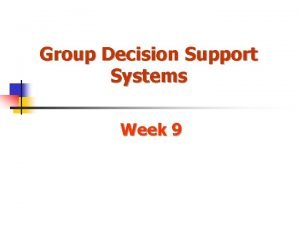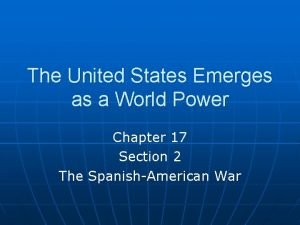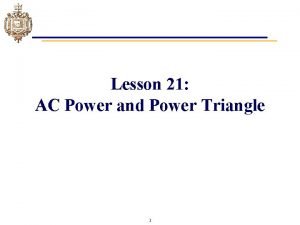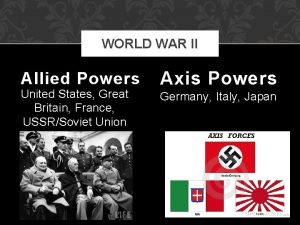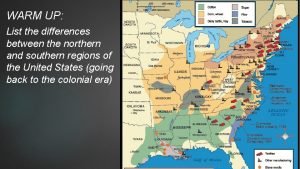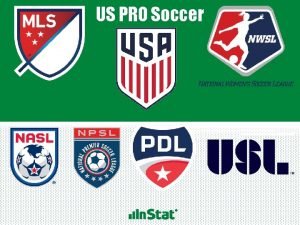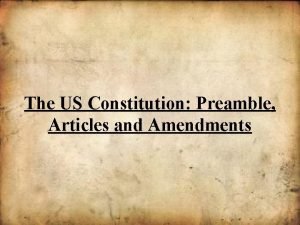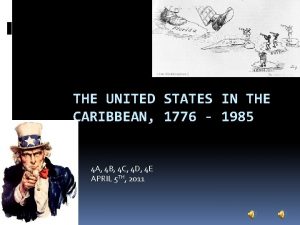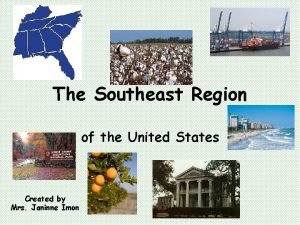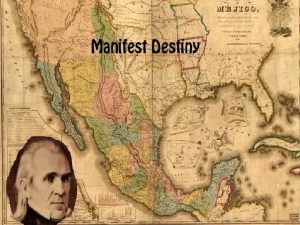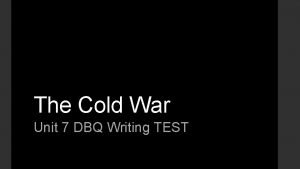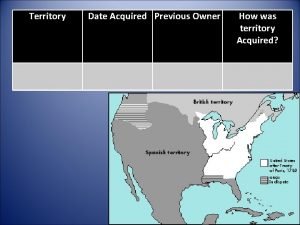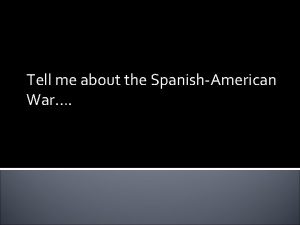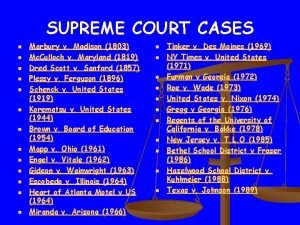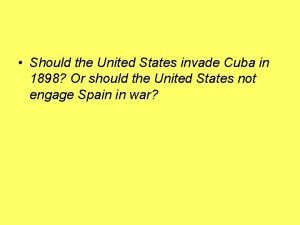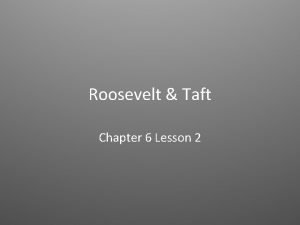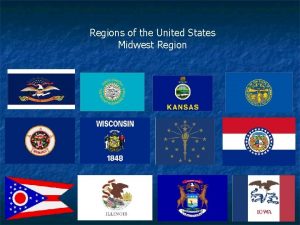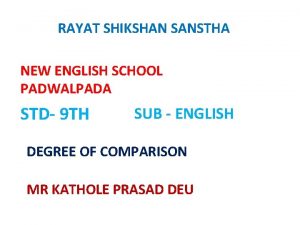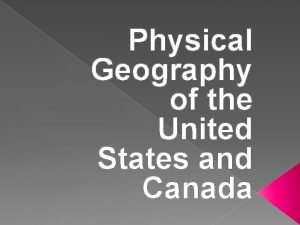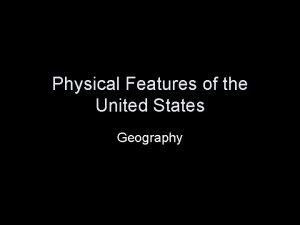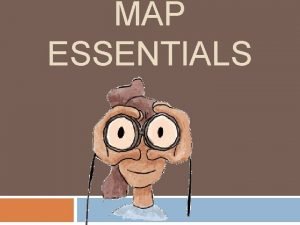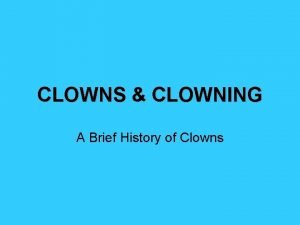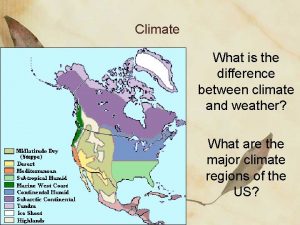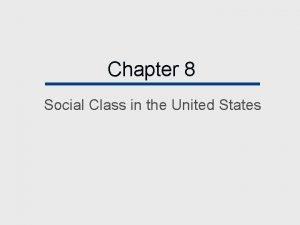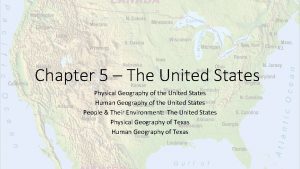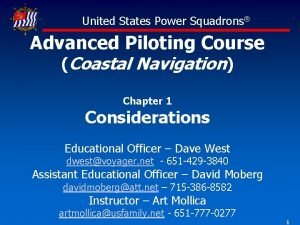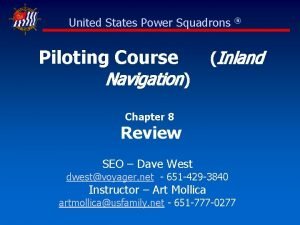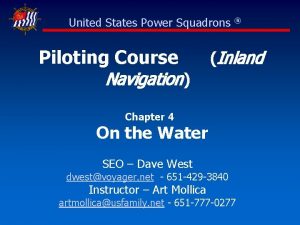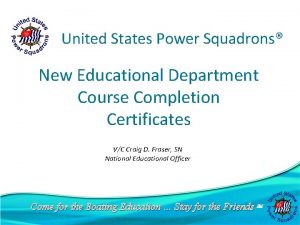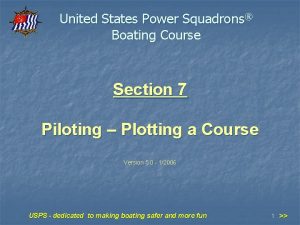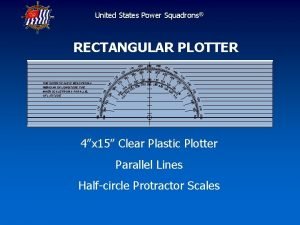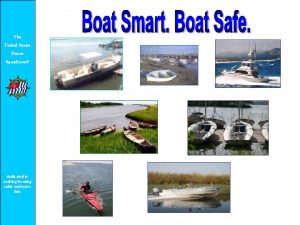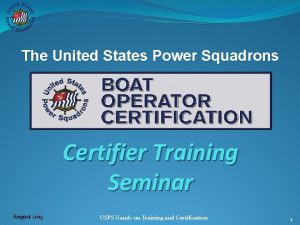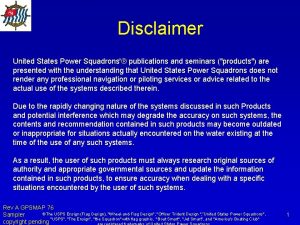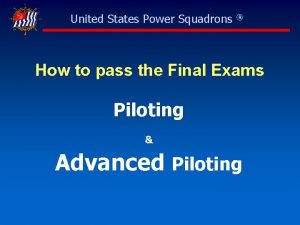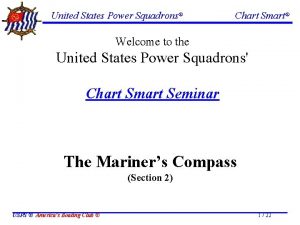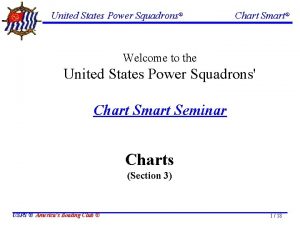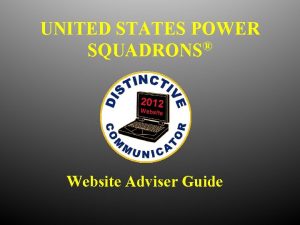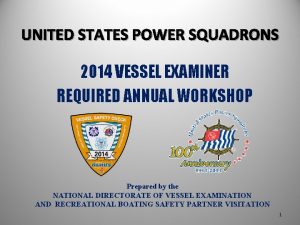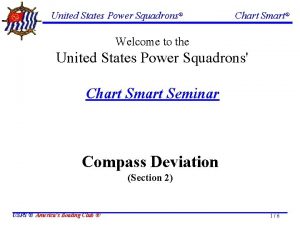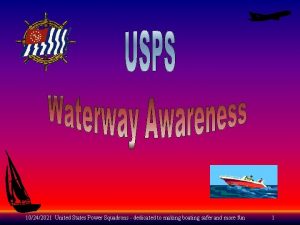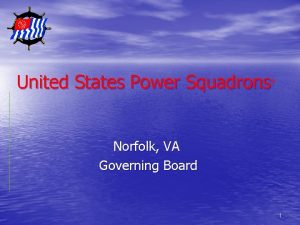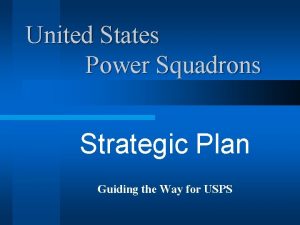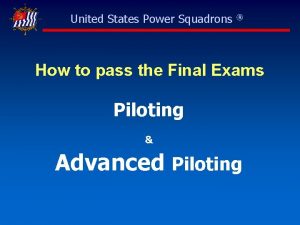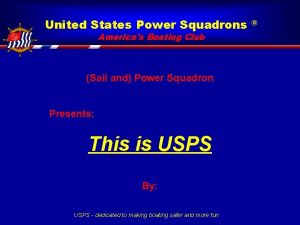United States Power Squadrons Advanced Piloting Course Coastal



































- Slides: 35

United States Power Squadrons® Advanced Piloting Course (Coastal Navigation) Chapter 3 Fixes Educational Officer – Dave West dwest@voyager. net - 651 -429 -3840 Assistant Educational Officer – David Moberg davidmoberg@att. net – 715 -386 -8582 Instructor – Art Mollica artmollica@usfamily. net - 651 -777 -0277

Any questions on homework from Chapter 1? 1. The chart projection used for U. S. coastal areas is: (b) Mercator. 2. An advantage of the Mercator projection is: (c) lines of latitude and longitude 3. When comparing a land mass at a latitude of 70ºN on a Mercator chart with a comparable size land mass near the equator, the: (b) land mass at 70 ºN will are at right angles to each other. appear larger. 4. Polyconic projections are useful especially when traveling over great distances. (b) 5. As long as a Polyconic chart is limited in extent, the curvature of the grid lines is negligible and the chart is very accurate. (a) True 6. On a Polyconic projection, the parallels of latitude are straight lines. (b) False 7. In planning a cruise, the steering error that can be expected under normal weather conditions is: (b) between 3 º to 5 º. 8. The smaller your boat’s compass, the easier it is to read. (b) False 9. One of the most important advantages of pre-plotting a cruise is that it tells you: False (c) areas of hazard to be avoided. 10. When underway in waters near land, it’s best to plot GPS fixes and time every: (c) hour or so.

Any questions on homework from Chapter 1? 11. Raster formatted digital charts: (b) have the look and feel of traditional paper charts. 12. Vector formatted digital charts: (d) are easily stored on chips or cartridges. 13. Digital charts are less accurate than traditional paper charts. (b) False 14. Using the zoom function on a raster digital chart increases the precision of detail. (b) False 15. Chart scale is a factor in determining the accuracy of a digital chart, therefore: (b) a large scale chart covers a small area with great detail. 16. The use of a Chartplotter requires: (d) input from a digital chart to activate the display.

Any questions on homework from Chapter 2? 1. Computer-assisted navigation systems are: (b) useful for planning a cruise in 2. The most accurate radar fix is obtained by: (d) using simultaneous ranges to 3. An electronic bearing line (EBL) lays a line of bearing over a target to: 4. The variable range marker (VRM) on the radar display screen is used to determine: 5. Range rings on a radar display screen allow the operator to estimate the: 6. According to the rules of relative motion: (b) all fixed objects appear to be 7. According to the rules of relative motion, on a boat’s radar screen when your boat increases speed going forward, all relative motion tends to move toward the bottom of the display screen. (a) True 8. Fixed objects can be differentiated from moving objects on the radar screen by noting which objects appear to be moving: (d) downward on the radar screen the comfort on one’s home or office. two or more known points. (b) determine the bearing to the target. (c) distance to a target. (a) distance to a displayed object. moving in the direction opposite from your boat’s motion. in relation to your boat’s course and speed.

Any questions on homework from Chapter 2? 9. A “lollypop” displayed on a radar screen is a dashed line to a circle: (b) indicating a GPS waypoint. 10. A depth sounder, when combined with another navigation tool, can be used to estimate a boat’s position. (a) True 11. The primary purpose of a depth sounder is to: (c) determined water depth below the hull of a boat. 12. Depth sounders can be used to crosscheck the proper functioning of the GPS. (a) True

Visual Bearing Limitations § Multiple Bearings • Simultaneous Bearings Often Difficult • Landmarks not Separated Sufficiently • Landmarks too Far Away • Only one Landmark available § Two Bearings on same Landmark • Sight Landmark from Different Directions • Second Bearing Somewhat Later • Called ‘Running Fix’ § Advance First Bearing to Current Position § Use Distance Run to Determine How Far 6

Running Fix N “ 3” 0 M 06 10 12 012 M 325 5 -1 093 5 M 325 093 12 10 C 28 5 M S 7. 5 1012 RFix 35 09 C 28 5 M S 7. 5 7

Running Fix 0 M S 7. 5 0 M 14 15 06 -14 0 M 45 C 09 06 14 15 N “ 9” 1445 RFix C 09 0 M S 7. 5 45 144 M 170 C “ 14” 8

Running Fix (open ocean) § Taught in JN § Charts not available • Create on using CLS § Nav. Aids not available § Sights on Sun • Morning • Noon • Evening § Advance • Morning to noon • Noon to evening • Evening to morning 9

Exercise 3 - 1 09 26 31 0955 0 M 55 09 M 60 092 2 31 6 0 M 09 55 Take out Bowditch Bay Chart. Using two bearings on the same landmark and advance an LOP to plot a Running Fix. C 099 M S 12. 0 0955 RFix 09 C 010 M S 6. 0 26 0900 Visual You T = are 355 nearly Vdue = north 015 W D M = (ST) 099 / of 60 41º 42. 7’N M= D V =G 6. 0 x 29/60 6. 0 x 26/60 015 W C” 1”, 72º 01. 6’W confirming D = 2. 9 nm T 2. 6 nm 000 your 084 C =position 010 C= D= M= V= T= 260 310 000 260 310 015 W 245 295 At 0900, depart R” 2” Fl R 4 s Oyster River on a true course of 355. Speed is 6. 0 Kn. At 0926, you take a hand bearing compass bearing of 310 on Chapman Point Light. At 0955, you take a second compass bearing of 260 on Chapman Point Light. With these two bearings, plot a running fix. What are the coordinates of the 0955 running fix? Seaman’s Eye: What can you use to confirm the accuracy of the 0955 fix? At 0955, you take up a magnetic heading of 099. You increase your speed to 12 Kn. 10

Homework Exercise 3 -1 Running Fix 13 31 30 8 M 13 30 55 092 6 -0 310 955 M 5 M 24. 0 C 6 S 09 C 099 M 12. 0 0955 S RFix 135 09 26 C 010 M S 6. 0 0900 Visual At 1330, take a handbearing compass bearing of 318º on “Fl R 6 s Horn. ” At 1355, take a handbearing compass bearing of 280º on “Chapman Pt “Fl 6 s” 1355 RFix 75 M C 1. 0 S 6 5 095 M 2601355 092 280 M 310 6 M 1300 GPS At 1300, depart from a GPS fix of L 41º 45. 0’ N, Lo 71º 55. 0’ W on true course of 230º and speed of 6. 0 kn. 5 13 30 31 -135 8 M 5 Plot 1355 running fix. What are the coordinates? L 41º 41. 6’ N Lo 72º 01. 7’ W Take up a heading to RW “OR” Mo(A).

Radar Fix § Compare with Chart • Identifiable features § Distinct Shorelines § Isolated Buoys § Plot • Convert Relative Bearings • Distance & Bearing to return echoes § Accuracy • Short Distances (<1/4 nm): EBL 55 ft; VRM 30 ft • Medium Distances (<2 nm): EBL 300 ft; VRM 75 ft • Long Distances (>3 nm): EBL 650 ft; VRM 200 ft 12

Radar Plotting Board 1/2 rr CPA / TCPA 1004 2. 4 nm 084º R 1010 1. 4 nm 064º R 1016 1. 0 nm 028º R 1016 1010 1004 Modern, high-end radar uses mini-automatic radar plotting aid (MARPA) – allowing you to identify vessel, speed, bearing, closest point of approach and time to closest point of approach. 13

Radar Images § Buoys are Point Targets • Challenge: Uniquely Identify Buoy § Shoreline Less Defined • • Shapes Change with Each Sweep Only See Forward Slope Low-lying Areas may not Provide Echoes Look for Point Features of Shoreline § Look for Prominent Regions • Get Distance from each Feature • Approximate Position Likely 14

M C 275 S 7. 5 Ti m e Position by Radar 15

Position by Radar 3 nm R/R 275ºM 1/2 AUTO H – UP M VRM 1 EBL 2 + EBL 1 245. 0º R VRM 1 01. 80 NM CURSOR BRG 000º RNG 01. 8 NM EBL 2 020. 0º R VRM 2 00. 00 NM 16

Position by Radar + 17

Position by Radar EBL 1 245ºR EBL 2 020ºR Range 1. 8 nm e m Time 295 M 1. 8 Ti D M C 275 S 7. 5 Time Radar e m Ti 0 M 16 MC 275º RB 245º 520º 360º MB 160º V 15ºW TB 145º 18

Exercise 3 – 2 Take out Bowditch Bay Chart. Using a radar range and a radar bearing on two objects, plot a radar fix. You depart RG “CP” Fl (2+1) R 6 s at 0900 on a magnetic heading of 112. Speed is 6. 0 Kn. M 122º V 15ºW T 107º C 112 M 0900 S 6. 0 Visual 19

Exercise 3 – 2 3 nm R/R 1/2 112ºM AUTO H – UP M + At 0950, this is your radar screen image, plot a radar fix. EBL 1 245. 0º R VRM 1 01. 50 NM CURSOR BRG 000º RNG 00. 0 NM EBL 2 000. 0º R VRM 2 00. 00 NM 20

Exercise 3 – 2 Take out Bowditch Bay Chart. Using a radar range and a radar bearing on two objects, plot a radar fix. 5 1. Visual D C 112 M 0900 S 6. 0 0950 Radar 09 50 0950 347 M 21

Homework Exercise 3 -2 Radar Position Determine where you are based on the radar screen below. What are the coordinates of your position? L 41º 38. 7’ N Lo 72º 05. 1’ W Which of the returns are from buoys? Which buoys? RG “CP” R “ 14” G “ 11” G “ 13” R “ 4” R “ 16” G “ 15”

10 MINUTE BREAK 10 9 8 7 TAKE 6 YOUR 5 4 SEATS 3 2 PLEASE 1

United States Power Squadrons® Advanced Piloting Course (Coastal Navigation) Chapter 4 Avoidance Techniques Educational Officer – Dave West dwest@voyager. net - 651 -429 -3840 Assistant Educational Officer – David Moberg davidmoberg@att. net – 715 -386 -8582 Instructor – Art Mollica artmollica@usfamily. net - 651 -777 -0277

Danger Bearings M T NM VSSPR 36 5 24 M T NL 0 07 VSSPR 34 25

Exercise 4 -1 Danger Bearing TWRN D 1 2. 10 5 8 1058 GPS C 105 M S 7. 0 NLT 0 C 0 37 S 7 M. 0 ORRW 1000 T = 022 V = 15 W M = 037 T = 090 V= 15 W M = 105 At 1000 depart ORRW for TWRN at 7. 0 kn. Plot a danger bearing that will keep you west of Channel Island, coming no closer than the 12 ft sounding curve. 30 M 1058 – 1000 = 0058 60 D = ST D = 7 x 58/60 D = 6. 8 Plot waypoint “TWRN” at Tower R Lt north of Channel Island “ORRW” at RW “OR” Mo “A”. T = 015 V = 15 W M = 030 Take a GPS fix when you reach a point 2. 1 nm from TWRN and the waypoint bears 037ºM. From this fix, take up a magnetic heading of 105º and increase speed to 9. 0 kn. 26

Danger Sector DANCHI NM T 23 5 M 0 M 25 T NL r ge r an o D ect S 27

Crosstrack Error (XTE) AISI 1 0. 6 nm XTE 0. 3 nm C 270 M AISI 2 28

Exercise 4 -2 Crosstrack Error Plot waypoint “BB 17” at 41º 38. 8’ N 71º 55. 0’ W and “BB 18” at 41º 38. 8’ N 72º 06. 7’ W. Using these waypoints as your intended course line plot and label a crosstrack error which will provide a safe passage. XTE 1. 0 C 285 M BB 18 BB 17 T = 270 M = 15 W M = 285 29

Danger Circle WFBPS 30

Exercise 4 -3 Danger Circle DCIR D NLT 0. 3 D NLT 1. 5 Using a charted visible object, plot and label a danger circle around the rocks at Rocky Neck Point. Create a GPS waypoint and plot and label a danger circle around the rocks south of Channel Island. DRNPR 31

Exercise 4 -4 Radar Avoidance 0. 5 D NLT 1. 3 Plot and label a radar danger circle to avoid the rocky area to the south of Channel Island to ensure you stay at least 0. 5 nm away from the rocks as you navigate on a true course of 270º. 32

Alarm Zones 33

Questions ? … Comments 34

Homework § Read Chapters 5 – Student Guide § Do Part I and II of the Weekend Cruise § Next Class – 3 May 35
 Piloting procter & gamble from decision cockpits
Piloting procter & gamble from decision cockpits Piloting procter & gamble from decision cockpits
Piloting procter & gamble from decision cockpits United states acquisitions and annexations 1857-1904
United states acquisitions and annexations 1857-1904 Real power formula
Real power formula Was the united states on the axis powers or allied powers?
Was the united states on the axis powers or allied powers? Mediterranean climate in us
Mediterranean climate in us Sectionalism map of the united states
Sectionalism map of the united states Soccer league hierarchy
Soccer league hierarchy Marshall case
Marshall case United states student association
United states student association The united states ought to provide a universal basic income
The united states ought to provide a universal basic income Article i of the constitution
Article i of the constitution The united states in the caribbean 1776-1985
The united states in the caribbean 1776-1985 Physical features of the southeast region
Physical features of the southeast region Expansion of the united states of america 1607 to 1853 map
Expansion of the united states of america 1607 to 1853 map How does nicholas novikov describe the united states
How does nicholas novikov describe the united states Original 13 states date acquired
Original 13 states date acquired Awake united states!
Awake united states! Mapp v ohio
Mapp v ohio We have pacified some thousands of the islanders
We have pacified some thousands of the islanders Lesson 2 roosevelt and taft
Lesson 2 roosevelt and taft Midwestern region of the united states
Midwestern region of the united states 7 regions of the united states
7 regions of the united states The united states is the greatest buyer positive degree
The united states is the greatest buyer positive degree United states and canada physical map
United states and canada physical map Major physical features of united states
Major physical features of united states Map of the world with longitude and latitude lines
Map of the world with longitude and latitude lines Fifty united states
Fifty united states Chapter 2 free enterprise in the united states
Chapter 2 free enterprise in the united states North central america
North central america Pygmy clowns
Pygmy clowns Subtropical united states
Subtropical united states Consequences of social class
Consequences of social class Physical geography of the united states
Physical geography of the united states Ibn-tamas v. united states
Ibn-tamas v. united states When mr pirzada came to dine theme
When mr pirzada came to dine theme

